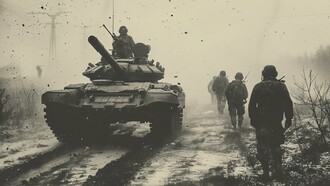In this text, the hyper-contemporary age is situated between the end of World War II and the present day. As in previous ages, what one age leaves behind for the next is covered in dust and rubble, and only through subsequent excavation can we know what has been inherited from the past and its meaning. Living in the present era, I can do no more than identify the dust and debris and point out to those who come after me where to excavate.
There are many signs that this era is coming to an end. I bring them together under the concept of apostasy. Apostasy is a term of religious origin meaning disaffiliation, abandonment, or renunciation of a religion, but it can be extended to any belief system. The signs of the end of the present era lie in the growing, more or less active abandonment of the beliefs that founded the current era. Here are some of the main ones:
From peace to war
This era began with the memory of the horror of war, especially the two world wars and the nearly 80 million dead. All the international institutions, conventions, and treaties that emerged at that time were specifically designed to prevent new wars. The concept of the Cold War was invented to distinguish it from real war. We know that real wars, including civil wars, continued on the periphery of the world system, but the hegemony of the belief in the superiority of peace over war helped to conceive of these armed conflicts as local and to foster international solidarity to end them.
We now know that the end of the Cold War in 1991 (the collapse of the Soviet bloc) marked the beginning of preparations for new hot wars by the US. Instead of disappearing, NATO expanded, extending its reach to Iraq and Afghanistan, bombing the Balkans in the 1990s, and fomenting the continuation of the war in Ukraine from 2022 onwards. All this contributed to the belief in the superiority of peaceful conflict resolution being progressively replaced by the superiority of the belief in war. Military budgets are now the fastest growing in most countries, and European leaders openly declare that Europe, the most violent continent in the world, must prepare for World War III.
On the US side, the military encirclement of China, with military bases in Japan, South Korea, the Philippines, Guam, and Thailand, increases polarization and the possibility of war. The peace movement, which until the beginning of this millennium mobilized millions of activists, is moribund. The superiority of war is now consolidated among the great powers, and media indoctrination is turning it into a new common sense.
From anti-fascism to the normalization of fascism
The superiority of democracy as a political regime emerged strongly after the Allied victory over Nazism. Even dictatorships, including those in the European Soviet bloc, claimed the legitimacy of democracy for themselves through the concepts of popular democracy and developmental democracy. Fascist and Nazi organizations survived in many countries, though in clandestinity or semi-clandestinity, and always outside the political spectrum. In Europe, Spain, Portugal, and Greece were an aberrant exception that would end in the mid-1970s. Outside Europe, there were military and civil-military dictatorships, but the consensus on the superiority of democracy and the legitimacy of the slogan “Fascism, never again!” was not questioned. Criticism of democracy came mainly from progressive forces against the limits of liberal democracy and in favor of a more robust democracy, both in terms of social rights and citizen participation.
Everything began to change with the so-called Washington Consensus of the late 1980s and the neoliberal creed it imposed globally (minimal state, the market as the great economic and social regulator, privatization, liberalization of financial markets, globalization). Democracy fully assumed its functional dependence on capitalism. The class struggle against workers' organizations and social and economic rights, the increase in social inequalities, and the control of public opinion, especially through the media and social networks, by capitalism, weakened the legitimacy of democracy among the working classes.
After the 2008 financial crisis, an authoritarian political discourse emerged that encouraged fascist organizations to come out of hiding, legitimized social polarization, and created the ideological space for the formation of far-right parties that explicitly transformed democracy into a mere instrument for ascending to power, rather than a means of exercising power. Today, they are in government in many countries and in some already control it. Left-wing criticism of liberalism has collapsed by replacing class struggles with identity struggles devoid of class content and has, in turn, been replaced by right-wing criticism of liberalism, which, to this end, has created the concept of illiberal democracy. Fascism with a democratic mask is now normalized, and the mask may even be dispensed with if no new anti-fascist resistance emerges in the meantime.
From decolonization to recolonization
The hallmark of this era was political decolonization, not because of the will of the colonial powers, but because of the strengthening of liberation struggles by colonized peoples. The newly independent countries realized early on that political independence was limited (neocolonialism), but the desire to deepen it inspired many international initiatives, from the Non-Aligned Movement (1961) to the New International Economic Order (1974). From the 1980s onwards, and especially after the collapse of the Soviet Union, multilateral economic agencies (the IMF and the World Bank) and the globalization of financial capital neutralized any initiatives to disobey the economic order imposed by neoliberalism.
The dependence of peripheral countries deepened. The ideological relegitimization of historical colonialism accompanied these transformations through a certain historical revisionism aimed at highlighting the advantages of colonialism for colonized peoples. In the last decade, the technological revolution and the so-called “energy transition” have created a new dispute among the great powers for control of access to natural resources, especially rare metals, which are found mainly in former colonized countries. This intensification of extractivism has been accompanied by the recolonization of minds through linguistic control and insidious indoctrination promoted by information technologies, the entertainment industry, and, ultimately, artificial intelligence. We live in an era that tolerates decolonial thinking but actively practices recolonization.
From the rivalry between capitalism and socialism to the rivalry between China and the US
The current era began with the world divided into two blocs with antagonistic ideological and political-economic systems: capitalism and socialism. This division was one of the pillars of political polarization in many countries, namely the division between the left and the right. With the collapse of the Soviet Union in 1991, the socialist world was confined to a few countries that were then considered peripheral (China, North Korea, Vietnam, and Cuba). The polarization between left and right entered a crisis from which it has not yet emerged. Meanwhile, China has undergone profound transformations, integrated itself into the global economic market, made an enormous contribution to the development of the US, become the world's second-largest economy, and is making an equally enormous contribution to the development of many countries through the new Silk Road.
The nature of the Chinese economic system is controversial. Is it socialism or state capitalism? The important thing is that polarization today is primarily economic, even though the capitalist world dominated by the US continues to insist on the polarization between democracy and autocracy. This insistence is becoming less and less convincing, given the transformations that the democracies mentioned above have undergone. Everything suggests that this era, which began with a high-tension political-ideological rivalry, will end with a rivalry between two types of capitalism, one centered on multinational corporations and global financial capital, and the other centered on state control over financial capital and strategic economic decisions.
From Holocaust Never Again to the normalization of genocide
The current era is unthinkable without the horror of the Holocaust. It goes unnoticed that while the Nazi final solution for the Jewish people lasted (especially 1941-1945), this horror was not intensely experienced (or even known) except by those who were its target. The liberation and dignification of the Jewish people marked the new era. However, they did so by transferring the costs of Europe's heinous crime to other peoples. Thus was born the State of Israel and the first Nakba of the Palestinian people.
Since then, this martyred people has held in its hands, against its will, the key to the dignity and destiny of the current era. The genocide in Gaza thus has a special significance. With it, the postwar world loses its last chance to celebrate the dignity of its victory over Nazism. Those who are not victims of this genocide cannot even invoke the ignorance that Europeans invoked when images of concentration camps and survivors' accounts began to circulate. The genocide in Gaza is broadcast live every day amid almost total indifference. The banality of evil is the end of an era.
The first excavations
An era only ends when there are signs that another is beginning. It may end in massive violence, which could be World War III or a revolutionary wave of civil wars in the form of class struggles between the impoverished masses and the elites. Or it may end peacefully through transitions in multiple sectors of social, economic, cultural, and political life. And it may end asymmetrically in both time and space. None of this is predictable. So, all we can do is start blowing away the dust and identifying the places where excavation is most promising. The main signs come in the form of questions:
Where to start the new peace?
Those who survive this era will be as zealous in the search for peace as those who lived at the beginning of the current era of apostasy. After centuries of deepening interdependence between countries, peace will have to begin with the multipolarity of the world. This is how this era began, and it is ending because it has abandoned multipolar coexistence and is dangerously insisting on imperial unipolar domination. All signs of multipolarity will be signs of peace.
What will be the final form of what we now call the rights of nature?
Ecological collapse is worsening, and at some point nature will force its way onto the political scene. At that moment (which perhaps only the survivors of the massive violence mentioned above will live to see), the now sacred principle of infinite economic growth will come to an end, and with it the current patterns of consumption. “Rights of nature” is a transitional idea, given that we always think of the new in terms of the old. But ascribing human rights to nature is already a paradigm shift in itself.
What will be the names and contents of the new socialism?
Without infinite growth, there will be no capitalism. If well-being is to be shared, not only among humans but between humans and nature, capitalism is historically doomed. Such broad sharing is unthinkable in capitalism. The same is true of the socialism that existed throughout the last century, even though the principle of sharing was much broader than capitalism made possible. It will be a new kind of socialist sharing, that is, a new form of social-natural solidarity.
What is the role of the BRICS?
The BRICS and the relations between China and the countries of Africa, Latin America, and the Caribbean (CELAC) are a great sign of the new multipolarity that will replace the unipolar imperial domination that still persists today. They will certainly succeed in answering the first sign question (peace). But it is doubtful that they will answer the second and third questions if they focus on multipolarity and do not evolve towards the alternatives that these questions presuppose.
Can China contain the US?
Anyone who follows Western political discourse, which is currently dominated by the US, will be convinced that the greatest danger is the growth of China's global influence and that the big question is how to contain China. For those who, like me, are concerned with the answer to the first question, the question is precisely the opposite: can China contain the US?
Where is the “Adolf Eichmann,” and where will he be tried?
The new era will be marked by a sharp break with the genocide of the Palestinians, just as the old era was born out of the memory of the genocide of the Jews. Great war criminals almost always escape. The same is not true of bureaucrats, whose role is to transform horror into technical banality. Surely, an “Adolf Eichmann” is currently ensuring that the slow genocide of the Palestinian people continues as normal, killing no more and no less each day than is necessary to achieve the final solution of the Palestinians with the least inconvenience and political cost to those in power in Israel. Who is he? Will he ever be found in Argentina or any other country? How will he be judged? The answers will be the hallmark of the new era.















